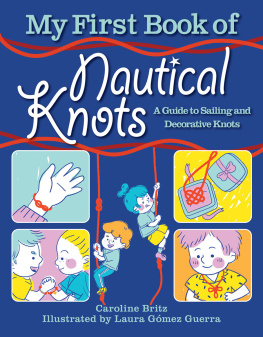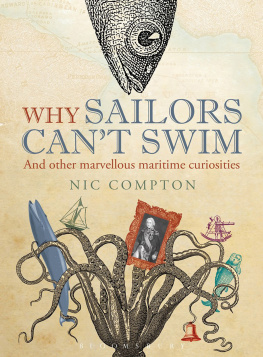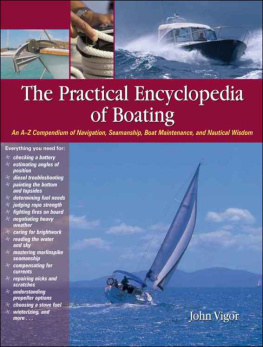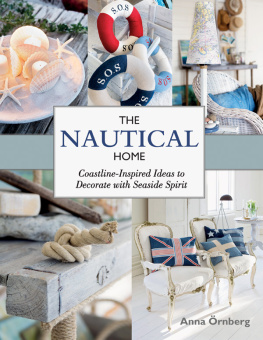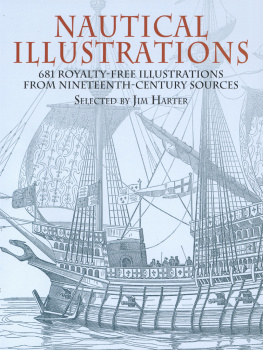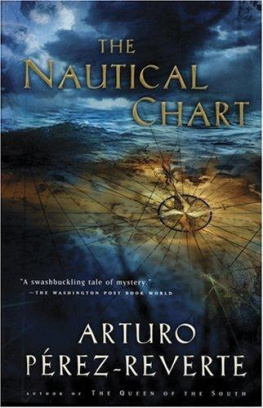CHAPTER 1
An AZ of Sea Slang

ABOVE BOARD One origin of this phrase is that pirates hid below board if they were sneaking up on an unsuspecting merchantman. Pirate ships carried up to 12 times the crew of an equivalent merchant ship. If all the crew were above board, all was fair and square. Also, early trading ships hid illegal cargo below the ships deck. Legal cargo could be placed in plain view on the deck, or above the boards of the deck. Thus anything illegal was below board.
AHOY This naval term seems, to this author, to stem from the hoy, a common 16th-century coastal vessel, although no dictionary confirms this derivation. One source states that Ahoy was a Viking battle cry. However, according to Smith in 1627, a ship was hailed thus Hoa the ship? or just Hoa!asking where it was bound. The answer was Hoa! Holloa was also used for hailing ships. The inventor of the telephone, Alexander Graham Bell, used ahoy when making a call, and the recognized answer in the early days of phones was hoy.
ALOOF, KEEP ALOOF On a lee shore, the order keep aloof meant to keep the ships head nearer to the wind to prevent the vessel from being driven on to the shore. Hence the modern expression to stay aloof means to keep away from, or keep your distance.
ANCHOR, TO BRING ONES ARSE TO AN To sit down.

ANTS BOLLOCK ON A BEACH Naval slang for something that is extremely difficult to locate.
APRICOT Cockney rhyming slang for beach, from apricot and peach.
AT LOOSE ENDS We are at a loose end if there is little to be done. The ends of rigging ropes at sea became easily unraveled, forming loose ends. They had to be tightly bound to keep them from unraveling, so when there was little work to do, the captain might order the crew to check the ropes for loose ends and repair them.
BEAM ENDSNearly on ones beam ends means that the ship is keeling over and about to sink, with the deck beams almost perpendicular to the seas surface. Now to be on ones beam ends means to be without money, a job or prospects, i.e. in a hopeless position.
BEAR UP A sailing expression meaning to bear the tiller up to windward in order to keep the vessels head away from the wind. It is in common use with the metaphorical meaning of Keep your spirits up!
BERTH, GIVE A WIDE BERTH The station at which a ship rides at anchor, either singly or as part of a fleet, is called the berth. To give a wide berth is to keep well clear of another ship.
BILGE WATER Because bilge water was so offensive, giving off noxious fumes and full of all sorts of unpleasant waste, to say that someone was talking bilge water, or just talking bilge, meant they were spouting rubbish.
BITE THE BULLET Men suffering flogging with a cat-o-nine-tails were often given a bullet to bite on to stop them screaming in pain. If the unfortunate sailors did sing out, they were cruelly dubbed a nightingale.
(REACH THE) BITTER END, AT THE END OF ONES ROPE, IN DEEP WATER These expressions refer to last part of the anchor cable that remains within the ship when the ship is at anchor. The anchor rope (now called a line) on old sailing ships was secured to an oak post called the bitt, which was fastened by partners to the deck. Securing turns were held around the bitt, as the anchor was paid out into the sea. The bitter end was the last part of the rope or cable, nearest the bitt. Thus to let a chain or rope out to reach the bitter end means that it has all been paid out and there is nothing left to release. It was hard work paying out the anchor. You were also physically at the end of your rope when you had reached the bitter end. If you came to the end of your rope without the anchor securing purchase on the sea bed, you were in deep water because there was no possible solution to the problem and the anchor was in danger of being lost.
BLACK-LIST A record of a persons misdemeanors kept by some officers for their private use, not abolished until the 19th century.
BLUE MONDAY, THE BLUES Traditionally the day for handing out the brutal punishments in the Royal Navy. There was a superstition that bad luck would befall the ship if this treatment was not delivered on Mondays. Nathaniel Boteler noted in 1685 that the idleness of ships boys is paid out by the boatswain with a rodand commonly this execution is done on Monday mornings.
BOMBED, BOMBARDED, TANKED UP This used to be a fashionable slang phrase for being drunk. A bombard was a leather jug or pitcher which held 4 or 8 pints (2.25 or 4.5 l) of ale. We must remember that ale was far stronger in past centuries, until beer was taxed on its strength during the First World War to stop munitions workers becoming slapdash after overindulging. Thus anyone who drank a full container was definitely bombarded or bombed. The phrase tanked up has a similar derivation, from a tankard.
BOOM AND MIZZEN Cockney rhyming slang for prison, from words denoting masts on a ship.
BORN WITH A SILVER SPOON This term was applied to those officers in the Royal Navy who entered the service without taking examinations on the strength of their family connections. They were said to have joined the navy through the cabin windows. Those born with a wooden ladle were officers who attained their posts by merit, and they were deemed to have entered the navy through the hawseholes, i.e. the apertures through which the anchor passes.
BOTTLE FISHING A slang term for the practice of transporting liquor into the United States during the Prohibition Era in the 1920s. This trade was easier, safer and much more profitable than fishing on the dangerous Grand Banks southeast of Newfoundland.
BRACE OF SHAKESIll be with you in a brace of shakes literally means Ill be with you before the sail has time to shake twice, in other words Ill be with you almost straight away.
BREAD HOOKS Hands or fingers when used in the ships mess.
Brought up short
If we say a person is brought up short, he is forced to a standstill by a sudden reversal of fortune. In the days of fighting ships a vessel underway could be brought to an emergency standstill or brought up short by dropping the anchors. As the anchor bit into the seabed, the ship shuddered to a standstill, accompanied by tremendous noise and clattering of masts and rigging. This action was sometimes due to a shot having been fired across a vessels bows as a warning. If she failed to stop, the next shot would be fired true, i.e. directly at her. Thus after a warning shot across the bows it was hoped that the intended prize vessel would immediately drop anchor and be brought up short, or brought up all standing.
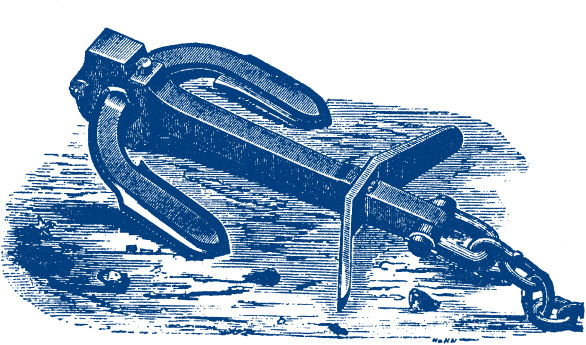
BRIDPORT DAGGER This Dorset town was renowned for the quality of its ropes, and was the preferred supplier to the Royal Navy. A






